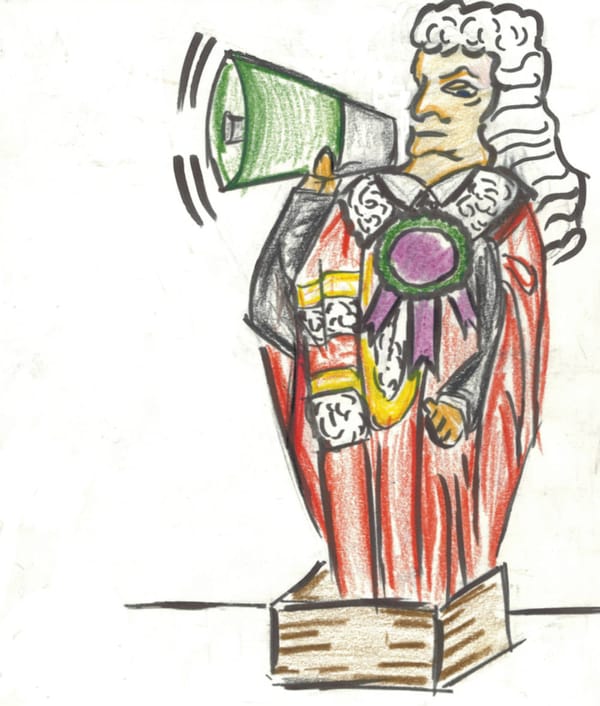Should prisoners be allowed to vote?
As the European Court of Human Rights overrules the UK government over prisoner rights, should prisoners have the same democratic rights as the rest of us?

Yes – Andrew Purcell
“There are fundamental democratic reasons”
Last week’s news that a high court judge had not only thrown out prisoners’ compensation claims, but also ordered the prisoners to pay £76 each towards the cost of their action, was greeted with a raucous cheer from Mail and Express readers, which could be heard all the way to Brussels. And, essentially, for Conservatives this was exactly their reason for making their ludicrous stand.
By denying prisoners their right to vote, a right enshrined by the European Court of Human Rights, euro-sceptic MPs are cynically aiming to undermine the EU’s authority to adjudicate on such issues. They are making an ideological stand, which has little or nothing to do with the actual issue in question, and are putting Britain in serious danger of becoming known as the petulant child of Europe. Britain’s prison population has simply been caught in the crossfire.
There are fundamental democratic reasons why prisoners should be disenfranchised. Politicians make the laws which govern our country, so denying prisoners a say in choosing the politicians, who make the very laws they have been convicted of breaking, is an extremely dangerous proposition. Perhaps this is less of an issue in Great Britain, where the majority of laws tend to have at least a reasonable moral basis. Yet, surely there is an argument for setting an example to countries such as China, where there are large numbers of political prisoners. But wait, before we start getting too self-congratulatory, let us not forget that a significant number of our prison population is made up of people who simply snort, smoke and inject various substances in the hope of improving their overall happiness. Let us also not forget that blasphemy only ceased to be a crime three years ago and that homosexuality has only been legal in Scotland and Northern Ireland since the eighties.
As well as the obvious ethical arguments for not denying prisoners the right to vote, there are also pragmatic reasons. A government which is currently undertaking a severe programme of public services cuts should probably think twice before committing itself to a path which will inevitably result in it paying hefty fines to Europe. Also, what about the idea of rehabilitation for prisoners? The government’s decision risks ostracising large swathes of the prison population from wider society. Surely, this is not a good way of reducing future crime rates.
Finally, what about the sheer hypocrisy of the situation? The government is trying to remove the right to vote from people who break the law, but in doing so they are breaking European law themselves!
No – Navid N
“This is idealistic but misguided”
In our society, we tend to view the democratic system with a certain sense of pride. The underlying principle of equal representation is deeply rooted in our social consciousness. For those who relate particularly strongly to this ideal, it is tempting to regard voting as an inalienable right; something beyond question.
This is idealistic but misguided. As with all rights, the right to democratic engagement is predicated upon related social responsibilities. This coupling of rights with responsibilities is natural, and absolutely essential: the responsibilities themselves preserve and ensure the accompanying rights. Hence, when an individual decides to abrogate their responsibilities, they forfeit their claim to the accompanying rights.
In the context of prisoner votes, we see that when someone commits a crime, they are flouting their responsibilities to society, and to the democracy which that society underpins. Consequently, they lose the claim to their democratic rights.
On a practical consideration, we must realise that the right to vote is just one of an entire range of rights which we suspend in order to punish prisoners. This punishment, though sometimes unpalatable, is absolutely necessary, in order to deter potential criminals and curb crime levels.
This refutes the argument of many proponents of prisoner votes, who complain that suspension of voting rights infringes upon civil liberties. They are completely right, and as we have just shown, this infringement is justified, and indeed necessary, on both a moral and a practical level.
Finally, we must consider the impact that this measure would have on prisoners. It is often stated that politically active prisoners are less likely to reoffend. The problem with this reasoning, of course, is simply that correlation does not imply causation. It is far more plausible that the type of prisoner less likely to reoffend just so happens to be of the type more likely to engage in politics; with no necessary causal relationship between the two.
Nevertheless, the more general argument that democratic involvement encourages prisoners to “re-engage with society” demands a more extended response. Consider first that most prisoners come from underprivileged backgrounds, often with little in the way of education. Because of this, the vast majority do not engage at all with the democratic system prior to incarceration. As such, there is no reason to suppose that the continuation of voting rights into prison would have any meaningful impact. In actual fact, a suspension of this right would make prisoners appreciate for the first time the value of democratic engagement. Upon their release – and the concurrent reinstatement of their rights – this would certainly aid in their general re-engagement with society.
For all these reasons; both the practical and moral considerations, we urge for a maintaining of the ban on prisoner votes.








